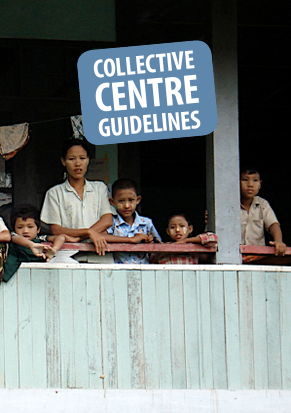
In many countries around the world, internally displaced persons have been forced to flee from their homes due to natural disasters or conflicts. Many seek temporary accommodation and protection in pre-existing buildings and structures commonly known as Collective Centres. To ensure the protection and assistance of IDPs are properly addressed, the CCCM Cluster has developed these guidelines for the management and coordination of Collective Centres. The Guidelines draw on the Camp Management Toolkit (2008), while focusing on particularities of Collective Centres. They highlight sectoral considerations throughout all aspects of Collective Centres following the below principles: • The State is the primary duty bearer toward Collective Centre residents. Appropriate support should be provided to enable the authorities to effectively assume their responsibilities, provide the necessary protection and look after the welfare of the displaced. • The planning process from Collective Centre set up to Collective Centre closure strives to ensure that durable solutions are found at the earliest possible opportunity. • Participation of Collective Centre residents in community decision making is vital. Men, women, boys and girls of all ages and backgrounds should always be included in the governance structures of the Centres, and capacitate to participate effectively in order to build their confidence and promote their involvement in identifying and addressing their needs and empowering their lives. • Assistance needs and protection concerns differ in long-term and shortterm collective centres. • The Collective Centre residents should be aware of the services available and how to access them. Distribution points should be accessible and distribution mechanisms should take into consideration groups with specific needs to minimize chances of violence, abuse and exploitation. • To the extent possible, contingency plans for various possible displacement scenarios should be elaborated, Such as for disasters that occur on a regular basis (e.g., flooding). • Management of the Collective Centres is crucial to the quality of life and dignity of residents. The Centre should also prepare residents for their life after displacement has ended. These guidelines focus on lessons learned from years of Collective Centre experience and seek to assist in the planning, implementation, monitoring, maintaining and overall management of Collective Centres to ensure protection and assistance to those in need.
Resource collections
- Evaluating humanitarian action
- UN Habitat - Urban Response Collection
- Urban Response - Urban Crisis Preparedness and Risk Reduction
- Urban Response Collection - Community Engagement and Social Cohesion
- Urban Response Collection - Economic Recovery
- Urban Response Collection - Environment and Climate Change
- Urban Response Collection - Housing, Land and Property
- Urban Response Collection - Urban Crisis Response, Recovery and Reconstruction
- Urban Response Collection - Urban Resilience